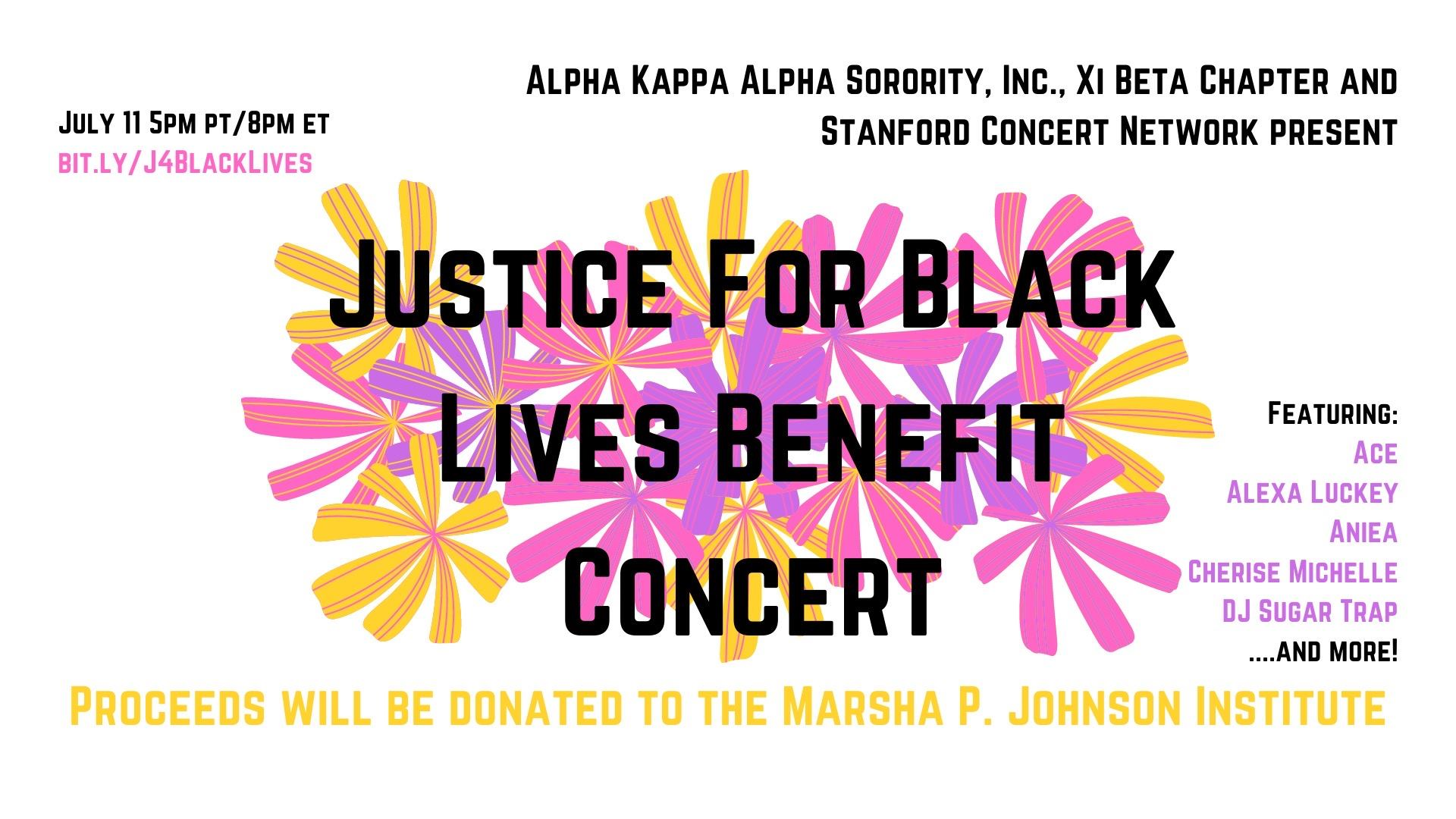On July 11, students in the Alpha Kappa Alpha Sorority, Inc., Xi Beta Chapter (AKA) sorority partnered with the Stanford Concert Network and other Greek organizations to bring to life the “Justice for Black Lives Benefit Concert.” The show was part of an ongoing Justice For Black Lives Fund, a project founded and led by Black women in AKA and other Greek organizations. The fund has donated to Bay Area charities centered around Black Lives Matter initiatives as well as to the Bail Project in order to support non-profits focused on anti-racist relief.
The show, streamed remotely, was still intimate, giving the viewer a glance into the life of the performer through their bedroom and humble setup. Pomona student and musician Cherise Higgins ’21, who goes by Cherise Michelle, played in front of a wall plastered with vinyl covers and behind a sparkly blackboard displaying the link to the Marsha P. Johnson Institute, while Stanford musician Angel Marie Smith ’21, also known by their stage name Ace, stood in front of a tapestry with bright red lights around the perimeter, evoking the dark room and flashing lights that are often part of live shows.
Michelle’s set began with “Good Days,” an original song about trying times and the reality that “someday good things will come,” — a much needed sentiment. The theme of hope in dark times carried into Ramona Greene ’21’s set, who goes by Ramona Nicholle, as she refused to let technical difficulties stop her from belting the words of Whitney Houston and Mariah Carey in her beautiful, clear voice.
“If people in the world remembered how to love each other, it would all be okay,” she said before performing “Wrong Places” by H.E.R..
Alexa Luckey ’21 followed, singing into a microphone and layering beats on top of each other. Luckey’s set included a song called “Be Me,” a fun, danceable track with lyrics like, “all I wanna do is be me, I can’t keep living up to who you wanna see” and a music video out on YouTube.
Another highlight was Ace, a black queer artist from Chicago, whose goal in performing is to “embody light” and “permeate the masses with truth.” Ace’s music was heavily influenced by the continued fight against racism, with lyrics like, “it’s reparations or revenge” and “I’m sick of losing friends to the system.”
Following Ace was Aniea Essien ’21, whose set also emphasized the Black American experience; she introduced her first song by noting that it’s about being black in the world, with lyrics like, “I could never walk away, I could never wash away.” Her music was an eclectic mix of love songs, calls to action and pieces like “The Simpsons,” which touched on the simplicity of the Simpsons’ world.
DJ Sugar Trap finished the night by remixing popular songs, prompting pumped-up commenters to note how much they miss DJ Sugar Trap parties.
Although livestreams are the closest we can get to live shows right now, some aspects of live music are irreplaceable — including the euphoric energy of a dancing audience. During her song “Icharus,” Cherise Michelle noted that spectators usually clap during a particular chorus — a part of the live music experience that cannot be replicated over Twitch, a streaming service owned by Amazon.
Organizer Celine Foster ’21 credits chat moderators with filling that gap, saying that “they did a great job in bringing some energy by livening up the chat.” Touching on the added benefits of online music, Foster said, “while less connected physically, we have the opportunity to unite digitally,” noting that the internet has the potential to bring free music to anybody and uplift Stanford artists to a much larger audience.
Furthermore, Blackfest and other online concerts provided a blueprint for what the Justice for Black Lives Benefit Concert should look like. Organizers note that planning Justice for Black Lives Benefit Concert was both easier and more difficult than a traditional live show; although not needing a stage and other musical equipment made the concert cheaper, SCN organizers Federico Reyes Gómez ’21 and Ricky Young ’21 had to work quickly during the show to maintain sound and video quality and fix microphone issues.
Each of the performers requested that viewers donate to the Marsha P. Johnson Institute, an organization carefully selected by benefit organizers with a goal to uplift one of the most marginalized identities in the Black community.
“Every single movement around social justice for the Black community would not have been possible without the advocacy and work of Black transgender people,” Mea Anderson ’21 a Xi Beta member said, before adding that Black trans people are the group most targeted by violence and most erased in social justice conversations. The reality of this inequality pushed planners to choose the Marsha P. Johnson Institute in order to “leverage the resources of the Stanford community to center and support Black trans people.”
The Justice for Black Lives Fund rose out of the realization that bail funds, legal aid funds, mutual aid funds and grassroots organizations are in serious need of financial support. Ace put it best: “Change happens when we release that change.” The fund has donated over $195,000.
Looking forward, the organizers of the Justice For Black Lives Benefit Concert hope to see it become an annual event that can continue to highlight Black student performers. Anderson said, “the music industry has profited off a lot of Black artists for a really long time while being very white-centric.”
Foster hopes that the “recent resurgence of the Black Lives Matter movement will allow for concert organizers to be more actively mindful when thinking about who they decide to put a spotlight on.”
Contact Sophia Peyser at speyser21 ‘at’ spenceschool.org.
An earlier version of this article incorrectly identified Alpha Kappa Alpha Sorority, Inc., Xi Beta Chapter as Alpha Kappa Alpha and incorrectly attributed quotes that were said by Mea Anderson ’21. The Daily regrets these errors.
